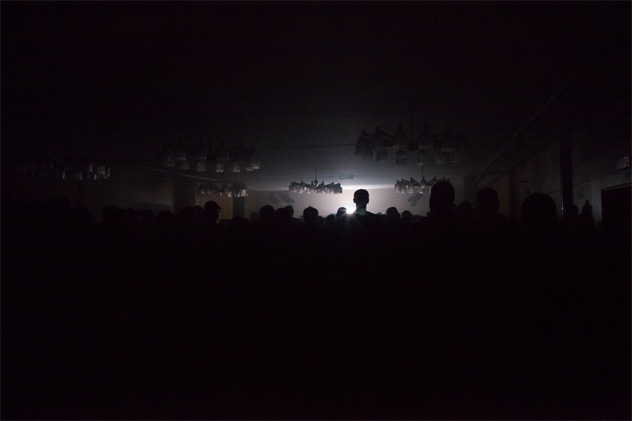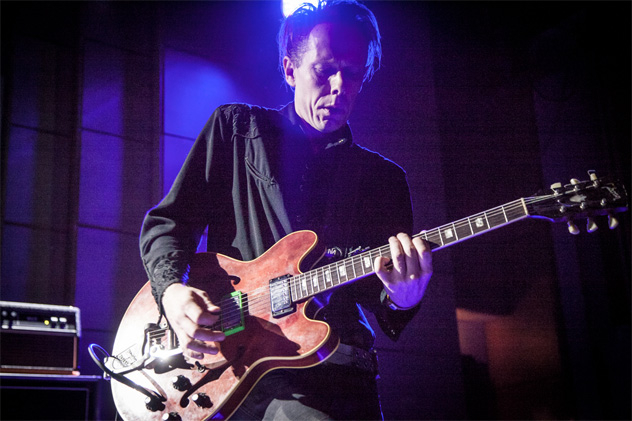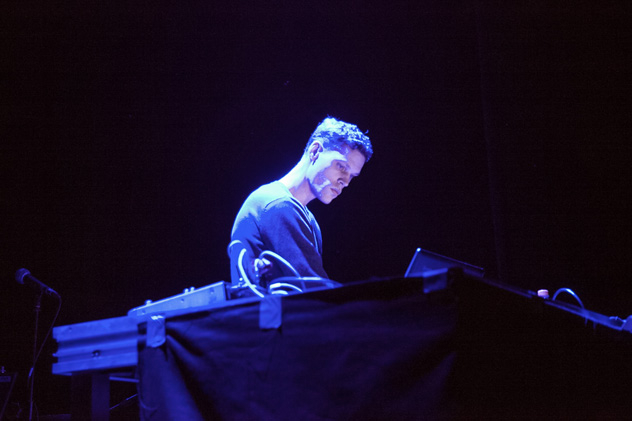- Unsound is the type of festival where you could attend a talk on sound art at 2 PM and be hurling yourself around a mosh-pit by 2 AM. The very European model of blending academia with music and art is well established by now, but few do it better than this long-running Polish festival. Unsound has a template, which it smartly stuck to in 2014. Attendees were invited to spend over a week in Kraków, a Polish city steeped in history, and engage with a stacked programme of performances, panels, films and installations. Thanks to the pace of the city—slow but not sleepy—and the convenient locations of the events, people at Unsound have a relaxed attitude, which helps soften the more pretentious edges which events of this type sometimes suffer from.
It also helps that Unsound puts on killer parties. These take place at Hotel Forum, a striking modernist building a short distance from the city centre. The club-focussed programme runs from Thursday to Saturday, and at full-tilt it features three rooms of music. In fact, "club" is often a strange way to describe the music at Hotel Forum—many of the most successful acts here took the term to its absolute breaking point. Of these, Powell impressed me the most. The UK artist, playing his first-ever live set, smashed the second room to pieces with something that sounded like a DJ aggressively train-wrecking industrial tracks. He was framed by a strobe light for the entire set (unbeknownst to him, he said later), which only heightened the performance's intensity.
Powell had followed on from Russell Haswell, who put down a marker for just how extreme these evening shows can be. The set was billed as a riff on his album for Powell's Diagonal label from earlier this year, but amid the sheer weight of the noise he was creating and his onstage antics—swearing at the crowd, feigning the end of his set six times—it was pleasingly hard to tell.
The Bug was also in the mood to fuck with people. His headlining set on the Saturday night took almost 30 minutes to fully get going—a risky approach that worked spectacularly—before he unleashed heavy-hitters like "Function," "Dirty" and "Skeng" and brought on a cast of guest MCs. Felicita and SOPHIE were the inverse of the Bug's antagonistic aesthetic, but they were just as interesting. The on-going "cute" debate was put to one side as people danced (and smiled) to hyper-glossy pop and dance mutations. Felicita in particular showed a will for experimentation that was equal to any other act at the festival.
 This bending of club music's strictures became a theme across the weekend, and is something that, over the years, Unsound has become particularly good at. You had Ripatti (AKA Vladislav Delay) taking apart footwork and reassembling it in strange and compelling ways, Amnesia Scanner examining hip-hop through the lens of extreme synthesis, Lotic playing R&B as though he were from a non-too-distant future, Mumdance and Novelist reimagining grime, and Lee Gamble showing just how broad a DJ can go.
These performances also had a curious knock-on effect: by comparison, I found Robert Hood (one of my favourite techno DJs) a bit too linear, and to my recalibrated ears, acts like Joey Anderson and Kassem Mosse felt somehow lacking. Jam City's debut live show, which saw him recast as a singer-songwriter (guitars and all), was unfortunately the weakest performance of the festival—I say unfortunately because without this innate desire to try new things we wouldn't have an album as groundbreaking as 2012's Classical Curves. Footwork's mix of irregular rhythms and familiar samples seemed to be a safe middle ground in all of this. Teklife's Spinn and Taso kept finding new ways to increase the "wow" factor in the tracks they dropped at the end of Friday night.
This bending of club music's strictures became a theme across the weekend, and is something that, over the years, Unsound has become particularly good at. You had Ripatti (AKA Vladislav Delay) taking apart footwork and reassembling it in strange and compelling ways, Amnesia Scanner examining hip-hop through the lens of extreme synthesis, Lotic playing R&B as though he were from a non-too-distant future, Mumdance and Novelist reimagining grime, and Lee Gamble showing just how broad a DJ can go.
These performances also had a curious knock-on effect: by comparison, I found Robert Hood (one of my favourite techno DJs) a bit too linear, and to my recalibrated ears, acts like Joey Anderson and Kassem Mosse felt somehow lacking. Jam City's debut live show, which saw him recast as a singer-songwriter (guitars and all), was unfortunately the weakest performance of the festival—I say unfortunately because without this innate desire to try new things we wouldn't have an album as groundbreaking as 2012's Classical Curves. Footwork's mix of irregular rhythms and familiar samples seemed to be a safe middle ground in all of this. Teklife's Spinn and Taso kept finding new ways to increase the "wow" factor in the tracks they dropped at the end of Friday night.
 People are less unified in their approach to the daytime and evening programme—something that is further complicated by the fact Kraków is a great place to simply hang out—but a number of shows felt mandatory. Swans headlined an enormous concert hall on the outskirts of town, and while they fit the bill, their extended experimentation had sections of the audience fidgeting. Something similar could be said of Nurse With Wound, another headliner. The UK act's dark ambient musings might have been better suited to a seated venue, as was the case with Cyclobe, who played the impressively slick Ice Kraków theatre, where people either spread out on the main floor or took a seat in the upper tiers. Stephen Thrower and Ossian Brown performed as part of a five-piece band, and their set had a powerful ritualistic quality that evoked both the natural world and space travel. TCF, one of several artists connected to the Berlin-based Janus crew who played the festival, pushed an almost euphoric beatless style at the same event.
People are less unified in their approach to the daytime and evening programme—something that is further complicated by the fact Kraków is a great place to simply hang out—but a number of shows felt mandatory. Swans headlined an enormous concert hall on the outskirts of town, and while they fit the bill, their extended experimentation had sections of the audience fidgeting. Something similar could be said of Nurse With Wound, another headliner. The UK act's dark ambient musings might have been better suited to a seated venue, as was the case with Cyclobe, who played the impressively slick Ice Kraków theatre, where people either spread out on the main floor or took a seat in the upper tiers. Stephen Thrower and Ossian Brown performed as part of a five-piece band, and their set had a powerful ritualistic quality that evoked both the natural world and space travel. TCF, one of several artists connected to the Berlin-based Janus crew who played the festival, pushed an almost euphoric beatless style at the same event.
 Some events occupied a sonic space that was all their own. The American noise/techno artist Container was part of a special commission that saw him emitting screeching electronics to the backing of Kenneth Kapstad and Tomas Järmyr, a pair of notably talented Norwegian drummers. By its very nature it was unlikely that the whole of the performance would work, but certain sections, like when the relentless drums and synthesis seemed to be singing to one another, were the sort of one-off moments you only get at Unsound.
On Sunday evening, people converged on an arts space for a club-focussed final party with Willie Burns, Total Freedom and a back-to-back set from Objekt and Call Super. Opinion was divided on the day's earlier event, a big double-bill with the US ambient artist Grouper and the celebrated producer and composer Craig Leon. Grouper was variously described as the best and worst set of the festival; as for Craig Leon, responses ranged from "fantastic" to "not bad" to "terrible." (I thought Grouper was musically engaging but visually clichéd, and that Leon was kind of bad on both fronts.) These sorts of friendly exchanges take place everyday at Unsound—forward-thinking music tends to spark debate.
Photo credits: Anna Spysz
Some events occupied a sonic space that was all their own. The American noise/techno artist Container was part of a special commission that saw him emitting screeching electronics to the backing of Kenneth Kapstad and Tomas Järmyr, a pair of notably talented Norwegian drummers. By its very nature it was unlikely that the whole of the performance would work, but certain sections, like when the relentless drums and synthesis seemed to be singing to one another, were the sort of one-off moments you only get at Unsound.
On Sunday evening, people converged on an arts space for a club-focussed final party with Willie Burns, Total Freedom and a back-to-back set from Objekt and Call Super. Opinion was divided on the day's earlier event, a big double-bill with the US ambient artist Grouper and the celebrated producer and composer Craig Leon. Grouper was variously described as the best and worst set of the festival; as for Craig Leon, responses ranged from "fantastic" to "not bad" to "terrible." (I thought Grouper was musically engaging but visually clichéd, and that Leon was kind of bad on both fronts.) These sorts of friendly exchanges take place everyday at Unsound—forward-thinking music tends to spark debate.
Photo credits: Anna Spysz
 This bending of club music's strictures became a theme across the weekend, and is something that, over the years, Unsound has become particularly good at. You had Ripatti (AKA Vladislav Delay) taking apart footwork and reassembling it in strange and compelling ways, Amnesia Scanner examining hip-hop through the lens of extreme synthesis, Lotic playing R&B as though he were from a non-too-distant future, Mumdance and Novelist reimagining grime, and Lee Gamble showing just how broad a DJ can go.
These performances also had a curious knock-on effect: by comparison, I found Robert Hood (one of my favourite techno DJs) a bit too linear, and to my recalibrated ears, acts like Joey Anderson and Kassem Mosse felt somehow lacking. Jam City's debut live show, which saw him recast as a singer-songwriter (guitars and all), was unfortunately the weakest performance of the festival—I say unfortunately because without this innate desire to try new things we wouldn't have an album as groundbreaking as 2012's Classical Curves. Footwork's mix of irregular rhythms and familiar samples seemed to be a safe middle ground in all of this. Teklife's Spinn and Taso kept finding new ways to increase the "wow" factor in the tracks they dropped at the end of Friday night.
This bending of club music's strictures became a theme across the weekend, and is something that, over the years, Unsound has become particularly good at. You had Ripatti (AKA Vladislav Delay) taking apart footwork and reassembling it in strange and compelling ways, Amnesia Scanner examining hip-hop through the lens of extreme synthesis, Lotic playing R&B as though he were from a non-too-distant future, Mumdance and Novelist reimagining grime, and Lee Gamble showing just how broad a DJ can go.
These performances also had a curious knock-on effect: by comparison, I found Robert Hood (one of my favourite techno DJs) a bit too linear, and to my recalibrated ears, acts like Joey Anderson and Kassem Mosse felt somehow lacking. Jam City's debut live show, which saw him recast as a singer-songwriter (guitars and all), was unfortunately the weakest performance of the festival—I say unfortunately because without this innate desire to try new things we wouldn't have an album as groundbreaking as 2012's Classical Curves. Footwork's mix of irregular rhythms and familiar samples seemed to be a safe middle ground in all of this. Teklife's Spinn and Taso kept finding new ways to increase the "wow" factor in the tracks they dropped at the end of Friday night.
 People are less unified in their approach to the daytime and evening programme—something that is further complicated by the fact Kraków is a great place to simply hang out—but a number of shows felt mandatory. Swans headlined an enormous concert hall on the outskirts of town, and while they fit the bill, their extended experimentation had sections of the audience fidgeting. Something similar could be said of Nurse With Wound, another headliner. The UK act's dark ambient musings might have been better suited to a seated venue, as was the case with Cyclobe, who played the impressively slick Ice Kraków theatre, where people either spread out on the main floor or took a seat in the upper tiers. Stephen Thrower and Ossian Brown performed as part of a five-piece band, and their set had a powerful ritualistic quality that evoked both the natural world and space travel. TCF, one of several artists connected to the Berlin-based Janus crew who played the festival, pushed an almost euphoric beatless style at the same event.
People are less unified in their approach to the daytime and evening programme—something that is further complicated by the fact Kraków is a great place to simply hang out—but a number of shows felt mandatory. Swans headlined an enormous concert hall on the outskirts of town, and while they fit the bill, their extended experimentation had sections of the audience fidgeting. Something similar could be said of Nurse With Wound, another headliner. The UK act's dark ambient musings might have been better suited to a seated venue, as was the case with Cyclobe, who played the impressively slick Ice Kraków theatre, where people either spread out on the main floor or took a seat in the upper tiers. Stephen Thrower and Ossian Brown performed as part of a five-piece band, and their set had a powerful ritualistic quality that evoked both the natural world and space travel. TCF, one of several artists connected to the Berlin-based Janus crew who played the festival, pushed an almost euphoric beatless style at the same event.
 Some events occupied a sonic space that was all their own. The American noise/techno artist Container was part of a special commission that saw him emitting screeching electronics to the backing of Kenneth Kapstad and Tomas Järmyr, a pair of notably talented Norwegian drummers. By its very nature it was unlikely that the whole of the performance would work, but certain sections, like when the relentless drums and synthesis seemed to be singing to one another, were the sort of one-off moments you only get at Unsound.
On Sunday evening, people converged on an arts space for a club-focussed final party with Willie Burns, Total Freedom and a back-to-back set from Objekt and Call Super. Opinion was divided on the day's earlier event, a big double-bill with the US ambient artist Grouper and the celebrated producer and composer Craig Leon. Grouper was variously described as the best and worst set of the festival; as for Craig Leon, responses ranged from "fantastic" to "not bad" to "terrible." (I thought Grouper was musically engaging but visually clichéd, and that Leon was kind of bad on both fronts.) These sorts of friendly exchanges take place everyday at Unsound—forward-thinking music tends to spark debate.
Photo credits: Anna Spysz
Some events occupied a sonic space that was all their own. The American noise/techno artist Container was part of a special commission that saw him emitting screeching electronics to the backing of Kenneth Kapstad and Tomas Järmyr, a pair of notably talented Norwegian drummers. By its very nature it was unlikely that the whole of the performance would work, but certain sections, like when the relentless drums and synthesis seemed to be singing to one another, were the sort of one-off moments you only get at Unsound.
On Sunday evening, people converged on an arts space for a club-focussed final party with Willie Burns, Total Freedom and a back-to-back set from Objekt and Call Super. Opinion was divided on the day's earlier event, a big double-bill with the US ambient artist Grouper and the celebrated producer and composer Craig Leon. Grouper was variously described as the best and worst set of the festival; as for Craig Leon, responses ranged from "fantastic" to "not bad" to "terrible." (I thought Grouper was musically engaging but visually clichéd, and that Leon was kind of bad on both fronts.) These sorts of friendly exchanges take place everyday at Unsound—forward-thinking music tends to spark debate.
Photo credits: Anna Spysz